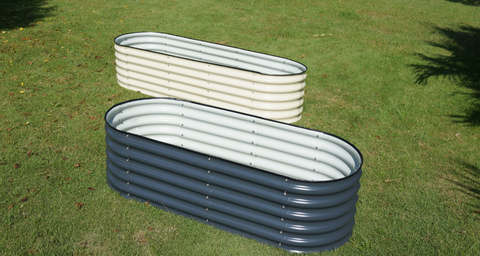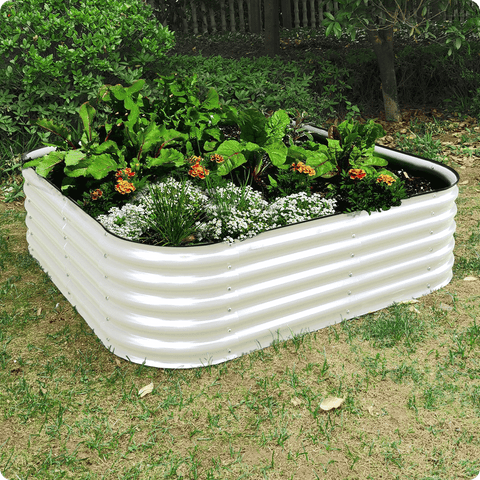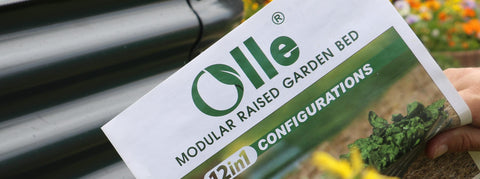5 Misunderstandings of Metal Raised Garden Beds and Why They Are Safe
When it comes to gardening, the metal raised garden bed has many favorite places. They have a rugged design that keeps your plants at the perfect height, so you don't have to bend or kneel to take care of them. In addition, these garden beds are available in a variety of shapes, sizes and colors
However, with the popularity of galvanized steel garden beds, people have questioned their effectiveness as plant containers. Are they safe for growing edible plants? Do they waste water? Are they too hot for your plants?
This article will dispel your fears and debunk many misconceptions surrounding metal garden beds.

5 Misunderstandings of Metal Garden Bed
#1: Zinc will seep into the soil
Galvanized steel is made by bonding a layer of zinc to the steel surface. This helps prevent metal from rusting.
One of the gardeners' biggest concerns about using metal garden beds is that the zinc used in this process will seep into the soil and damage any plants and vegetables growing in it.
Although a small amount of zinc may seep into your soil for a long time, it is not necessarily a bad thing for your vegetables or the people who eat them.
Zinc is a natural mineral found in garden soils. In fact, plants and humans need a small amount of zinc to survive.
Your plant may not absorb enough trace zinc from the garden bed to affect your plant or harm anyone who eats vegetables grown in the garden bed.
In addition, galvanized steel beds are very durable and require exposure to a large amount of acidity in order to decompose the steel. Most garden soils are pH neutral, so they are highly unlikely to damage your garden bed.
If you are still worried about the possibility of zinc immersion in the soil, please consider. In the past, galvanized steel has been safely used as the main material for various food and water related items, including watering troughs, granaries, water reservoirs, and even domestic water pipes for livestock.
#2: The metal garden bed gets too hot
Metal conducts heat. It is usually warm to feel when sitting in the sun.
Can metal garden beds cause plants and soil to overheat? The answer is no.
On warm days, the soil temperature near the edge of the garden may rise slightly, but it is not enough to have any impact on your plants. If you water your garden bed plants correctly, you don't have to worry about them drying up.
Like metal garden furniture or fences, metal garden beds can warm up after sitting in the sun for a long time, but can still be safely touched and handled.
In fact, at the end of the growing season, when the temperature starts to drop, metal materials will insulate your plants from the soil and keep the soil temperature more consistent.
#3: Metal raised garden beds require a lot of soil
One of the main advantages of a raised garden bed is that you can choose the best type of soil for a particular plant without relying on the existing soil in the yard or garden.
However, beginner gardeners may be a little afraid of the initial amount of soil required to set up the garden bed.
Sure, garden beds do need soil, but they are not as much as you think. Most plants and vegetables need only about a foot of good soil to grow.
Instead of filling the entire garden bed with soil, cover the bottom half of the bed with fillers such as pine cones, packaged peanuts, or sand. Then, place a piece of landscape fabric on the top of the filler and fill the upper half with the soil you like.
#4: Metal raised garden beds require a lot of water
The raised garden bed is usually large, and the idea of keeping the bed watered seems daunting, but by following some tips, you can keep the soil moist without watering the garden bed often.
In gardening, whether you are planting underground, in garden pots or in garden beds, selecting the right soil is the key.
The best soil choice for a raised garden bed is a light soil mixture. This type of soil will keep moisture, so you don't have to water the bed often. Avoid using loose sandy soil because the water flows through it too fast and you need to water it again.
When plants need to be watered, they are deeply watered in the soil around the base of the plant. Don't water their leaves or flowers. Soaking hoses or drip irrigation systems are two useful watering methods for garden beds.
#5: Poor drainage of metal garden bed
On the other hand, another continuing myth about the raised garden bed is contrary to myth # 4, that is, the metal garden bed is poorly drained, and your plants will drown in water. This is also not true.
Again, it is a great benefit to be able to choose the right soil for your metal garden bed, because you can choose light soil that is easy to drain. In addition, many garden beds are either bottomless or have drainage holes, making it easy for water to pass through the soil and enter the ground.

Maintain your metal garden bed to ensure its safety
Now that you know more about the metal garden bed, here are some additional tips that can help you maintain the garden bed to extend its product life, solve some of the problems mentioned above and grow healthier plants and vegetables.
Avoid acid soil: In order to further prevent a small amount of zinc from seeping into the soil, do not use high acid soil or improver in the garden bed, because acid is the cause of decomposition of galvanized steel over time.
Use lining: If you really plan to plant plants that need acid soil, use plastic lining on the side of the garden bed to prevent the soil from directly contacting the side of the flowerpot.
Add mulch: Adding mulch to your garden bed will help prevent evaporation, so your garden bed will retain moisture longer.
Water plants early: Another technique for properly watering garden beds is to water them early in the morning before the sun rises above the sky. This helps ensure that your plant gets the water it needs before it evaporates.
Select the correct position: When setting the garden bed, please place it in a place where there is no sunshine all day to prevent the garden bed from drying under high temperature.
Build your dream garden with durable metal elevated garden beds

Now that we have clarified some myths and misunderstandings about metal garden beds, you can rest assured that you can use these fashionable containers to grow delicious vegetables and beautiful flowers.
You'll love the many benefits these elegant containers offer. With its durable structure and unique appearance, you will be able to plant your favorite plants season after season.
